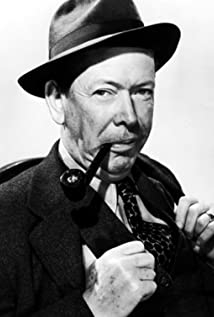Frank Craven, the actor, director, playwright and producer who achieved theatrical immortality as The Stage Manager in the original 1938 Broadway production and 1940 movie version of Thornton Wilder's classic Une petite ville sans histoire (1940), was born into a theatrical family on August 24, 1875 in Boston, Massachusetts. The son of John T....
Show more »
Frank Craven, the actor, director, playwright and producer who achieved theatrical immortality as The Stage Manager in the original 1938 Broadway production and 1940 movie version of Thornton Wilder's classic Une petite ville sans histoire (1940), was born into a theatrical family on August 24, 1875 in Boston, Massachusetts. The son of John T. Craven and Ella Mayer Craven, he first trod the boards in Boston as a child. He made his Broadway debut in George Ade's comedy "Artie" at the Garrick Theatre on October 28, 1907. In 1914, he starred in and directed the first of his many plays to be produced on the Great White Way, "Too Many Cooks" [Original, Play] The play, which opened on February 24 and closed in September 1914, was a hit, lasting 223 total performances.His 1924 Broadway play "New Brooms (1925)" which he wrote, produced and directed, was made into a major motion picture the following year by Paramount. Screenwriter Clara Beranger adapted the play for the film, which was directed by William C. de Mille. As a screenwriter himself, Craven worked on La foire aux illusions (1933); in all, he wrote or contributed to eight films, including an adaptation of his own 1932 play That's Gratitude (1934), which he also directed and starred in at Columbia. His most famous screen work was providing the story for the Laurel & Hardy comedy Les compagnons de la Nouba (1933) and adapting "Our Town" for the screen. In addition, seven of his plays were made into movies and one of his short stories was adapted for television production.Crave, as a playwright and screenwriter, generally stuck to the domestic comedy genre rooted in the trials and tribulations of everyday family life. As an actor, Craven was willing typecast as an actor as small-town men with a wry sense of humor. He made his acting debut on the Big Screen in an uncredited role in the 1928 drama L'âme d'une nation (1928) for Universal. At R.K.O. the following year, he directed and starred in the movie adaptation of William LeBaron's play The Very Idea (1929), which he co-directed with _Richard Rosson (I)_. Then, he returned to Broadway.His film career began in earnest after Fox signed him to a contract in 1932. At Fox, he appeared in Handle with Care (1932) before writing the screenplay and playing the Storekeeper in the classic "State Fair", which starred superstar Will Rogers. In all, he acted in almost two score films.Craven returned to Broadway in 1935 to direct the play "A Touch of Brimstone", which opened in September and closed after 98 performances. He also directed and performed in the World War One drama "For Valor" on Broadway, a flop that lasted only one week of eight performances. His next appearance on Broadway, three years later, was more memorable."Our Town", which opened at Henry Miller's Theatre on February 4, 1938 and ran there and at the Morosco for 336 performances, won the 1938 Pulitzer Prize for Drama. The play set in to the fictional Grover's Corners, New Hampshire between 1901 and 1913, also was the Broadway debut of his son John Craven, who played one of the main roles, George Gibbs. The independently made film of "Our Town" was released in 1940, with Craven reprising his role as the Stage Manager (with William Holden replacing his son in the role of George Gibbs). The movie, directed by Sam Wood, earned seven Academy Award nominations and remains a part of the mystique of the American classic.Craven appeared on Broadway in three more productions after "Our Town". His last appearance was in Zoe Akins' "Mrs. January and Mr. X" in 1944. He died on September 1, 1945 in Beverly Hills, California, shortly after completing his role in movie Colonel Effingham's Raid (1946). He was 70 years old.
Show less «



